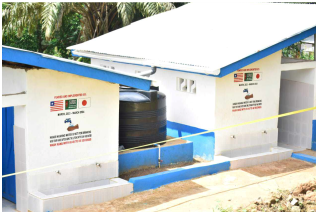By Laurina B Lormia
Over 11,500 residents and 550 school-going kids have benefited from modern sanitation facilities and hand-pumps in Bong County.
The project which was implemented by the Sustainable Urban and Rural Integrated Development Organization (SURIDO) with funding from the Government of Japan, aimed at providing modern sanitation facilities at three targeted academic institutions in Jorquelleh District, Bong County.
The three beneficiary schools include, Kerkula Farm Public School, Gbelekpala public school and the St. Matthew Academy in Gbarnga City, Bong County Central Liberia.
Speaking at the ceremony over the weekend at the St. Matthew Academy in Bong County, the Japanese Ambassador to Liberia Mochizuki Hisanobu, expressed excitement and appreciation over the construction and dedication of the modern sanitation facilities.
According to him, the project’s funding is in line with the objectives of the Grant Assistance for Grassroots Human security Project (GGHSP) intended to address basic human needs at the grassroots level such as health, education, water supply among others.
“The projects which also include the construction of Hand-pumps will benefit more than 11,500 inhabitants of the surrounding communities as the Pumps will be opened to the public after school hours,” he added.
Hisanobu noted that, the completion of the projects which was implemented by SURIDO attests to the shared determination to address the pressing issue that students of the three schools were experiencing over the years.
“Bilateral relationships subsisting between the governments and people of Japan and Liberia are yielding significant benefits for the ordinary citizens, especially school-going kids in Liberia.”
He added, the facilities will not only promote good health and hygiene but also create a conducive learning environment that will ensure that all children, regardless of gender, will attend school regularly and comfortably.
Making remarks, the Executive Director of Sustainable Urban and Rural Integrated Development Organization (SURIDO), Paul Jaiblai described the commissioning of the Water, Sanitation and Hygiene (WASH) facilities at the three schools as another historic moment for the Organization and its partners.
According to him, in 2019, they received their first grant from the Japanese Embassy to implement similar projects for four schools in Suakoko District.
He, however, appreciated the Japanese Embassy, for always believing and trusting in the ability of SURIDO to implement projects on its behalf, amid the numerous organizations operating in the Country noting, “I am very happy today because this is not the first time SURIDO is implementing projects on behalf of the people of Japan here in Liberia.”
He added that, he is pleased to report that through the construction of those WASH facilitates in those various schools, girls enrollments have increased and he wants to thank the government of Japan for all they continue to do for the people of Liberia.
He emphasized the sustainability aspect of the facilities while admonishing the administrations and students of the beneficiary institutions to ensure that the facilities are properly managed to meet its desired objectives
“The duration of the project is up to ten years, so we will continue to make follow-up to ensure that the facilities are well taken care of because the monies being used to build these facilities for our people came from taxes being paid by the citizens of Japan,” he concluded.
Meanwhile, the Development Superintendent of Bong County, Selekee Kromah, the District Education Officer, (DEO) Josiah Massaquoi and the Ministry of Public Works’ WASH Coordinator in Bong County, Flomo Zayzay in separate remarks appreciated the Japanese government for such brilliant initiatives within the county, and urged the school administrations to properly maintain and sustain the sanitation facilities on their campuses, to enhance the learning capacity of the students especially adolescent girls.

